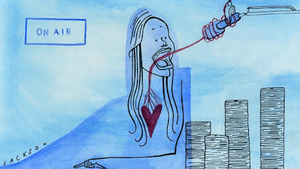Stay in the Loop
BSR publishes on a weekly schedule, with an email newsletter every Wednesday and Thursday morning. There’s no paywall, and subscribing is always free.
Three things I learned from being on the radio
Kile Smith on the perils of being a WRTI-FM deejay

Drums and bass guitar fell by the wayside a long time ago. A combination of reasons explain it, but mainly, after a good spell of trying, I realized that I wasn’t particularly good at playing them. It was a relief to find out — to others surely, but to me, especially. Dropping them allowed me to spend time on what I thought I really needed to do, which was to write music. I have discovered in the 40 years since that I needed as much time as possible to work just on that.
I have somewhat regretted not being a performer. Most composers are; that is, most composers can play the piano or some other instrument to at least a middling extent. Many excel; I honor them. Me, I’ve sung all my life in amateur choirs. That has helped me (I do believe) write choral music better, and has provided insight into music generally, but I have never experienced performing at a professional level (although playing bass in a ’70s jazz-fusion band did slip me billet-doux with whispered teases from that world).
I stumbled into performance, though, as a classical radio host. I realized it only when, after being on WRTI-FM infrequently for 10 years, and then, after filling in regularly for nine months — when I was kicked upstairs to director of content, where I am now responsible for the programming, website, and audio production of the station — that on-air hosting is a performance.
I’ll continue to voice spots and to fill in live here and there, but now that I’m not on the air every day, I realize that the on-air host is a performer. So I may have some kinship with performing musicians after all. Here’s what I’ve learned.
1. Nobody cares how long you practice
Gennady Rozhdestvensky strikes fear into my heart. Whenever I see his name on a program log, I shudder, because I know I will have to say his name on the air. Now, I’ve botched a few pronunciations, but Gennady Rozhdestvensky I have practiced over and over. I once practiced saying, out loud, Gennady Rozhdestvensky five times in a row until satisfied, then turned on the mic, promptly said Gennady Roach Deaf Vent Keys, and then — and then! — tried to fix it.
At that moment, thousands of innocent people, driving or working or drinking coffee but in any event grateful for lives wherein they could turn on the radio and hear classical music, heard me bludgeoning the beloved conductor Gennady Road Dead Fancies, Gennady Rose Fat Stinkies, Gennady Rooftop Shpilkas, over and over, so that, from Carlisle to Egg Harbor Township, from Scranton to Dover, they were now, coffee cup suspended halfway between table and lip, eyebrow-arch-listening to me, Jerry Lewis as the Disorderly Orderly, flayvin!, Gennady Roll Dem Phlegm Speed, lady...!
This is my memory of it. I had no idea how I got out of that break. All I know is that I didn’t dare say my own name for the rest of the shift.
The thing is, I know what happened. I was very proud that I had said Gennady correctly: gen-YAH-dee. Lovely. But pride goeth before awful, so I blithely launched into Rozhdestvensky — with the result you see above. My betters nail it every time, but they’ve been nailing it for the 40 years I’ve been writing music, so slow down already, Smith, and stick to what you practiced, I should’ve.
Professionals and amateurs all practice, you see. The difference is this. Amateurs practice until they get it right. That’s what I did. Professionals practice until they can’t get it wrong.
And that’s the No. 1 of what I learned.
2. Be yourself
I listen to radio hosts in other formats — KYW, WOGL, others — but I’ve studied the WRTI hosts, classical and jazz, and learn from all of them. Gregg’s excitement; Jack’s nuance; Kevin’s cadence; Jill’s empathy; Bob P., than whom no one on earth is more cool; Bob C., who could read a 7-11 receipt and make it sound like Kerouac; Jeff’s range; J. Michael’s trust: Everybody schools me. From intros to back-sells, from weather to time, from promo placement to what to say when you’ve been knocked out of your chair by a symphony or by a CD skipping, I learn from everybody.
I’d get my sea-legs sooner or later, they said, and it took me half a year, full-time, for that to happen. After 10 years’ subbing, it took that long. I still make mistakes; we all do, on every radio station mistakes happen. But from emoting, to laughing, to stretching, to finishing a complete sentence in the eight seconds before a hard break into the I.D. and news while introducing the next jock, I relaxed, finally, and became myself. That’s No. 2.
3. Nobody cares if you be yourself
No. 3 is “Forget No. 2.” The advice to the young player is “Play the ink.” You got notes on the music stand; play the notes. Don’t go raising your hand or your expectation, “Do you want it louder or slower or how about if I...,” no. No. Play the notes. That’s your job.
On-air hosts have a program log, a spot log, and an arm-full of CDs. Calculate your timing, play the stuff you have to, calculate your timing, introduce everything correctly, hit your marks, calculate your timing, hit the hard breaks to the second, and by the way, calculate your timing.
Do that and you’ll be fine. Do that and relax, and you’ll be better. Do that, relax, tell us something we didn’t know in as few words as possible, bring your passion to all the thousands of listeners, each of whom feels like you’re speaking only to him, speak every word in love...and you’ll be fantastic.
These are the three things I’ve learned. And slow down, cowboy, at Gennady Rozhdestvensky.
Sign up for our newsletter
All of the week's new articles, all in one place. Sign up for the free weekly BSR newsletters, and don't miss a conversation.

 Kile Smith
Kile Smith
 Illustration by Mike Jackson
Illustration by Mike Jackson